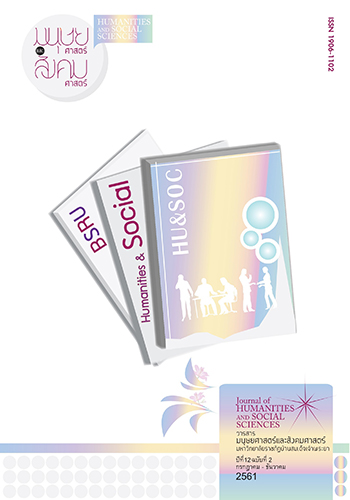The Speech Act of Students’ Complaints to Parents and Factors Contributing to the Complaints
Keywords:
Complaining Strategies, Speech Act, Emancipatory Pragmatics, Rapport Management, Language and CultureAbstract
The study of speech act can help people understand a communicative behavior in each society through words selection based on social context and culture. Thereby, this research has objectives to firstly, study linguistic strategies employed by students in expressing their complaints to their parents. Secondly, to study factors influencing speech act of complaints. Lastly, this study would like to identify reasons contributing to and causing students not to express their feeling by speech act of complaints. The Emancipatory pragmatics and Rapport management are used as methodologies in this study. The Researcher collected data by a survey with two sets of questionnaire, 139 copies for each set in according with stratified random sampling. The two questionnaires are 1.general information (anonymous) and decision to or not to use speech act of complaints in four situations and 2.questionnaire for asking factors contributing and influencing their decision to select linguistic strategy. At the end, there was an interview to acquire additional data from representatives of respondents. The research found that linguistic strategies employed by students in their parents complaining have in total of 21 sub-strategies with one additional strategy. The sub-strategies can be classified into three groups, they are: 1. Strategies used to express disagreement with actions or ideas of parents - 14 sub-strategies.
2. Strategies used to maintain good relationship – 4 sub-strategies. 3. Strategies used to demonstrate impacts – 3 sub-strategies. Besides, it is found that “Face” and “Sociality rights” as referred to in Spencer-Oatey’s suggestion (2002) has influence on their linguistic strategy selection while gratitude toward “Phumiphrakhun” in Thai society is the main reason for not complaining.
References
กุลยา ตันติผลาชีวะ. (2559). ครอบครัวกับวัยรุ่น. ใน เอกสารการสอนชุดวิชาพัฒนาการวัยรุ่น หน่วยที่ 8-15. (น.8-1 - 8-58). นนทบุรี : มหาวิทยาลัยสุโขทัยธรรมาธิราช.
คลี่ปมสังหารยกครัว 3 ศพ อึ้งคดีพลิกที่แท้ ‘ลูกชายคนโต’ มือฆ่า จ่อยิงพ่อแม่น้อง ฉุนกดดันหนัก ขอรถใหม่ไม่ให้. (2557, 11 มีนาคม). เดลินิวส์, น.1.
จำเนียร จวงตระกูล. (2553). การวิจัยเชิงคุณภาพ : เครื่องมือสร้างองค์ความรู้เพื่อการพัฒนาประเทศ. กรุงเทพฯ : ศูนย์กฎหมายธุรกิจอินเตอร์เนชั่นแนล.
ฉลาด จันทรสมบัติ และทองสง่า ผ่องแผ้ว. (2555). การเขียนวิทยานิพนธ์. (พิมพ์ครั้งที่ 3). กรุงเทพฯ : มหาวิทยาลัยมหาสารคาม.
ชาญวิทย์ เยาวฤทธา. (2555). แนวคิดเรื่อง “บุญคุณ” กับวัจนกรรม 3 ชนิดในสังคมไทย. วิทยานิพนธ์อักษรศาสตรมหาบัณฑิต สาขาวิชาภาษาไทย จุฬาลงกรณ์มหาวิทยาลัย.
ทรพีทำแผน 3 ศพ จ่อยิงเรียงหัวพ่อแม่น้อง อ้างถูกด่า-เบี้ยวซื้อรถให้ สำนึกผิดขอขมาหน้ารูป. (2557, 12 มีนาคม). ไทยรัฐ, น.1.
นววรรณ พันธุเมธา. (2551). ไวยากรณ์ไทย. กรุงเทพฯ : โครงการเผยแพร่ผลงานวิชาการ คณะอักษรศาสตร์ จุฬาลงกรณ์มหาวิทยาลัย.
ประชุม สุวัตถี. (2552). การสำรวจด้วยตัวอย่าง: การชักตัวอย่างและการวิเคราะห์. กรุงเทพฯ : โครงการส่งเสริมพัฒนาเอกสารวิชาการ สถาบันบัณฑิตพัฒนบริหารศาสตร์.
เพ็ญแข วัจนสุนทร. (2528). ค่านิยมในสำนวนไทย. (พิมพ์ครั้งที่ 3). กรุงเทพฯ : โอเดียนสโตร์.
เมตตา วิวัฒนานุกูล. (2556). หลักการสัมภาษณ์ในวงการบริหารการสื่อสารมวลชนและการวิจัย. (พิมพ์ครั้งที่ 3). กรุงเทพฯ : จุฬาลงกรณ์มหาวิทยาลัย.
รุ่งอรุณ ใจซื่อ. (2549). วัจนกรรมการแสดงความไม่พอใจในภาษาไทย: กรณีศึกษานิสิตนักศึกษา. วิทยานิพนธ์อักษรศาสตรมหาบัณฑิต สาขาวิชาภาษาไทย จุฬาลงกรณ์มหาวิทยาลัย.
วัลภา สบายยิ่ง. (2559). สังคมกับวัยรุ่น. ใน เอกสารการสอนชุดวิชาพัฒนาการวัยรุ่น หน่วยที่ 8-15. (น. 9-1 - 9-52). นนทบุรี : มหาวิทยาลัยสุโขทัยธรรมาธิราช.
วิจิตรมาตรา, ขุน (สง่า กาญจนาคพันธุ์). (2541). สำนวนไทย. (พิมพ์ครั้งที่ 4). กรุงเทพฯ : ส.เอเซียเพรส.
วิเชียร รักการ. (2529). วัฒนธรรมและพฤติกรรมของไทย. (พิมพ์ครั้งที่ 2). กรุงเทพฯ : โอเดียนสโตร์.
สิทธิธรรม อ่องวุฒิวัฒน์. (2549). วัจนกรรมการตักเตือนในภาษาไทย: กรณีศึกษาครูกับศิษย์. วิทยานิพนธ์อักษรศาสตรมหาบัณฑิต สาขาวิชาภาษาไทย จุฬาลงกรณ์มหาวิทยาลัย.
สุภางค์ จันทวานิช. (2557). วิธีการวิจัยเชิงคุณภาพ. (พิมพ์ครั้งที่ 22). กรุงเทพฯ : จุฬาลงกรณ์มหาวิทยาลัย.
อคิน รพีพัฒน์, ม.ร.ว. (2553). มองสังคมผ่านชีวิตในชุมชน. กรุงเทพฯ : ศูนย์มานุษยวิทยาสิรินธร (องค์การมหาชน).
Hanks, W. F., Ide, S., & Katagiri, Y. (2009). Introduction: Towards an emancipatory pragmatics. Journal of Pragmatics, 41 (1), 1-9.
Hurford, J. R. & Heasley, B. (1990). Semantics: a coursebook. Great Britain : Cambridge University Press.
Spencer-Oatey, Helen. (2002). Managing rapport in talk: Using rapport sensitive incidents to explore the motivational concerns underlying the managementof relations. Journal of Pragmatics, 34, 529-545.
Downloads
Published
How to Cite
Issue
Section
License

This work is licensed under a Creative Commons Attribution-NonCommercial-NoDerivatives 4.0 International License.




